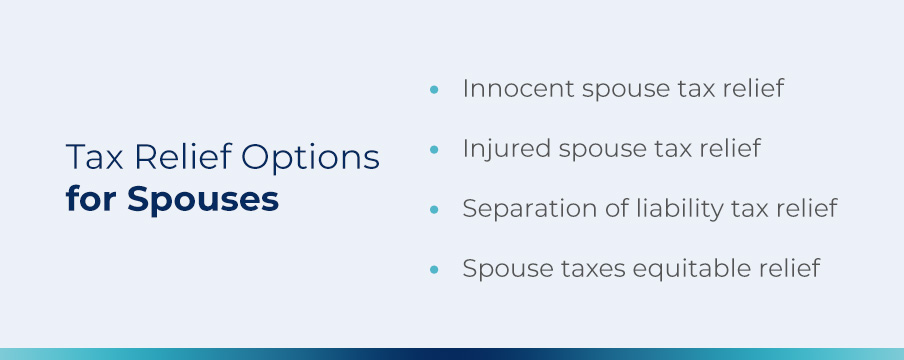Getting married often means sharing numerous aspects of your life, such as your home, finances and even debt. If your spouse owes back taxes, understanding your liability risk is essential. At BC Tax, we have extensive experience navigating back taxes for couples and individuals. Contact us to learn more about how our services can provide peace of mind.
What Are Back Taxes?
Back taxes are taxes that are partially or entirely unpaid. Much like other forms of debt, they are subject to interest and penalties leading to a higher balance.
If My Spouse Owes Back Taxes, Am I Liable?
Yes, the IRS can hold you liable for your spouse’s tax debt under certain circumstances. Your filing status can impact whether you are responsible for their debt. When you get married, you can file jointly or separately. Filing jointly means both spouses are liable for the tax debt. Filing separately means you have individual tax returns, and only your spouse is responsible for their debt.
Understanding Your Liability
There are several ways to determine if you are liable for your spouse’s back taxes:
When Was the Debt Incurred?
Timing is a significant factor in determining if you are liable for your spouse’s back taxes. If your spouse had tax debt before marriage, only they are responsible for repayment. If your spouse accumulates tax debt while you are married, you may be liable based on your filing status.
What Was the Filing Status?
If you file jointly, you are both on the same tax return, making you both liable for the tax debt. The IRS may pursue either spouse for the entire amount, even if you are not responsible for the debt. By filing separately, you are only responsible for your tax liabilities.
Did You File in a Community Property State?
The following states follow community property laws in which spouses are jointly responsible for all assets and debts:
- Arizona
- California
- Idaho
- Louisiana
- Nevada
- New Mexico
- Texas
- Washington
- Wisconsin
In community property states, you are liable for your spouse’s taxes, even when filing separately. However, community property states have specific rules regarding IRS and state tax debts, so you may have different options for avoiding your spouse’s tax liability. To benefit most from community property laws, file your tax returns as married, filing separately.
Exploring Tax Relief Options for Spouses

Whether your spouse brings tax debt into the marriage or accumulates it later, several tax relief options are available:
- Innocent spouse tax relief is for divorced individuals whose spouse failed to report their entire income, claimed credits they weren’t eligible for or took false deductions.
- Injured spouse tax relief is for individuals who are currently married and their portion of their joint tax refund paid for their spouse’s preexisting debt.
- Separation of liability tax relief is for individuals who were married at the time of filing but now can prove they are legally separated or divorced from their spouse.
- Spouse taxes equitable relief is a safety net for those who don’t qualify for other relief options, preventing you from being liable for your spouse’s unpaid taxes on a joint return.
Get Help From the Tax Experts at BC Tax to Fully Understand Your Situation
Are you responsible for your spouse’s back taxes? By partnering with BC Tax, you’ll have an experienced team who can determine the right payment plan for your financial situation. We understand the ins and outs of tax liability and relief and will help you find a solution while granting peace of mind. Contact us to take the first step toward tax relief.

 1-800-548-4639
1-800-548-4639








